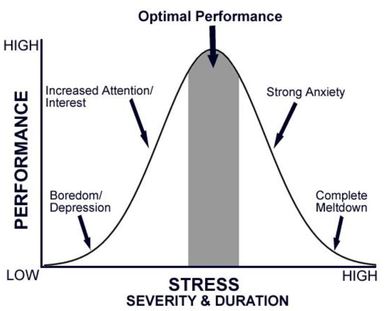
This article is the most viewed article in the history of Linkedin. We hope you can glean from it as you endeavor to unlock your Godly destiny.
Dr Bradberry shares, "The ability to manage your emotions and remain calm under pressure has a direct link to your performance. TalentSmart has conducted research with more than a million people, and we’ve found that 90% of top performers are skilled at managing their emotions in times of stress in order to remain calm and in control.
If you follow our newsletter, you’ve read some startling research summaries that explore the havoc stress can wreak on one’s physical and mental health (such as the Yale study, which found that prolonged stress causes degeneration in the area of the brain responsible for self-control). The tricky thing about stress (and the anxiety that comes with it) is that it’s an absolutely necessary emotion. Our brains are wired such that it’s difficult to take action until we feel at least some level of this emotional state. In fact, performance peaks under the heightened activation that comes with moderate levels of stress. As long as the stress isn’t prolonged, it’s harmless.
Research from the University of California, Berkeley, reveals an upside to experiencing moderate levels of stress. But it also reinforces how important it is to keep stress under control. The study, led by post-doctoral fellow Elizabeth Kirby, found that the onset of stress entices the brain into growing new cells responsible for improved memory. However, this effect is only seen when stress is intermittent. As soon as the stress continues beyond a few moments into a prolonged state, it suppresses the brain’s ability to develop new cells.
“I think intermittent stressful events are probably what keeps the brain more alert, and you perform better when you are alert,” Kirby says. For animals, intermittent stress is the bulk of what they experience, in the form of physical threats in their immediate environment. Long ago, this was also the case for humans. As the human brain evolved and increased in complexity, we’ve developed the ability to worry and perseverate on events, which creates frequent experiences of prolonged stress.
Besides increasing your risk of heart disease, depression, and obesity, stress decreases your cognitive performance. Fortunately, though, unless a lion is chasing you, the bulk of your stress is subjective and under your control. Top performers have well-honed coping strategies that they employ under stressful circumstances. This lowers their stress levels regardless of what’s happening in their environment, ensuring that the stress they experience is intermittent and not prolonged.
While I’ve run across numerous effective strategies that successful people employ when faced with stress, what follows are ten of the best. Some of these strategies may seem obvious, but the real challenge lies in recognizing when you need to use them and having the wherewithal to actually do so in spite of your stress.
So, what are these attributes that these successful people possess? They include:
Dr Bradberry shares, "The ability to manage your emotions and remain calm under pressure has a direct link to your performance. TalentSmart has conducted research with more than a million people, and we’ve found that 90% of top performers are skilled at managing their emotions in times of stress in order to remain calm and in control.
If you follow our newsletter, you’ve read some startling research summaries that explore the havoc stress can wreak on one’s physical and mental health (such as the Yale study, which found that prolonged stress causes degeneration in the area of the brain responsible for self-control). The tricky thing about stress (and the anxiety that comes with it) is that it’s an absolutely necessary emotion. Our brains are wired such that it’s difficult to take action until we feel at least some level of this emotional state. In fact, performance peaks under the heightened activation that comes with moderate levels of stress. As long as the stress isn’t prolonged, it’s harmless.
Research from the University of California, Berkeley, reveals an upside to experiencing moderate levels of stress. But it also reinforces how important it is to keep stress under control. The study, led by post-doctoral fellow Elizabeth Kirby, found that the onset of stress entices the brain into growing new cells responsible for improved memory. However, this effect is only seen when stress is intermittent. As soon as the stress continues beyond a few moments into a prolonged state, it suppresses the brain’s ability to develop new cells.
“I think intermittent stressful events are probably what keeps the brain more alert, and you perform better when you are alert,” Kirby says. For animals, intermittent stress is the bulk of what they experience, in the form of physical threats in their immediate environment. Long ago, this was also the case for humans. As the human brain evolved and increased in complexity, we’ve developed the ability to worry and perseverate on events, which creates frequent experiences of prolonged stress.
Besides increasing your risk of heart disease, depression, and obesity, stress decreases your cognitive performance. Fortunately, though, unless a lion is chasing you, the bulk of your stress is subjective and under your control. Top performers have well-honed coping strategies that they employ under stressful circumstances. This lowers their stress levels regardless of what’s happening in their environment, ensuring that the stress they experience is intermittent and not prolonged.
While I’ve run across numerous effective strategies that successful people employ when faced with stress, what follows are ten of the best. Some of these strategies may seem obvious, but the real challenge lies in recognizing when you need to use them and having the wherewithal to actually do so in spite of your stress.
So, what are these attributes that these successful people possess? They include:



 RSS Feed
RSS Feed